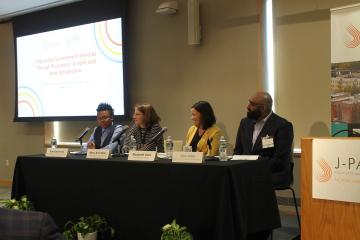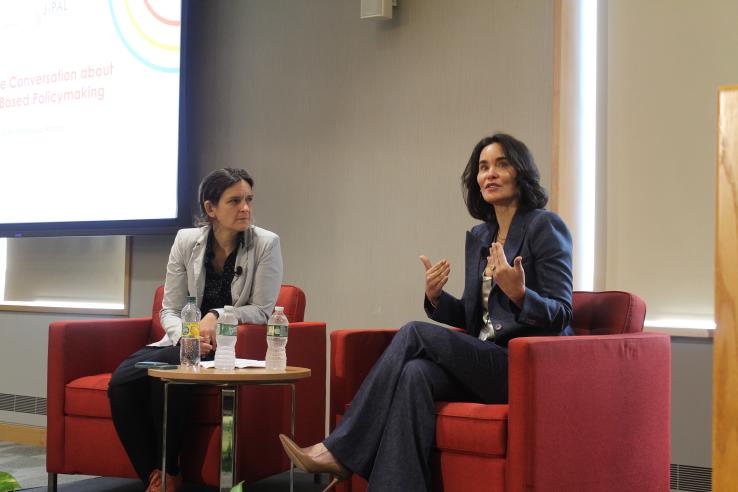
Recapping a conversation between leaders in evidence-based policy making from J-PAL North America’s ten year convening

2023 marks the Abdul Latif Jameel Poverty Action Lab’s (J-PAL) twentieth year of evidence-based policymaking and J-PAL North America’s tenth. To honor these milestones, J-PAL North America convened a two-day event in September—one of several regional celebrations to honor J-PAL’s anniversaries worldwide.
During day two of the convening, Esther Duflo, Abdul Latif Jameel Professor of Poverty Alleviation and Development Economics at MIT and J-PAL Co-Director and Co-Founder, and Laura Arnold, Co-Chair of Arnold Ventures, joined together to discuss J-PAL and Arnold Ventures’ partnership in building a culture of evidence-based policymaking. Arnold Ventures, a philanthropy aimed at applying evidence-based solutions to some of the most pressing issues facing the United States, has been a key supporter of J-PAL North America’s work for the last decade.
The path to evidence-based policy
To lay the groundwork for their dialogue, Laura gave insight into how she and her husband, John Arnold, aimed to create an organization that mirrored their values: “Our values are based on understanding what works from an evidence perspective. So, we created a filter of thinking through issues that started with identifying a problem in the United States … and where we thought philanthropy could create better solutions,” Laura explained. For Laura, their core values are rooted in understanding, “a problem with a rigorous perspective and get[ting] to solutions based on evidence.”
Laura went on to highlight that, to her, “aspiration [is] to create an organization that leads with evidence, that leads with an honest discussion of what we do and what we don’t know…that leads with humility and an understanding that social science deals with humans.” She also expressed the importance of being committed to serving communities through evidence; “If we care about solving the nation’s biggest problems, if we care about addressing the needs of our most at risk communities, we have to approach the problems with the sincerity of understanding if something doesn’t work.”
Prioritizing transparent, effective, and innovative solutions
Throughout Esther and Laura’s conversation, two major themes emerged: prioritizing open-mindedness in fidelity to the research and emphasizing a commitment to serving communities effectively.
Esther highlighted Arnold Ventures’ “great humility in looking at the data and in taking conclusions from the data.” Esther spoke about how essential Arnold Ventures has been in supporting researchers to identify the truth, regardless of the researchers’ and partners’ original goals or projections. Affirming Esther’s point, Laura noted, “everybody here understands the value of a null finding. And the value of a null finding, I would argue, in many cases is much higher than the value of a positive finding.” Together, Esther and Laura highlighted the importance of learning from failures in order to inform action. Reflecting upon key examples, such as the Camden Core Model’s evaluation, Esther and Laura emphasized the value of being able to pivot a program’s efforts and funding towards improvement and innovation.
Esther and Laura also explained evidence-based policymaking’s role in truly serving communities. Specifically, Laura provided insight into how evaluating policy initiatives is necessary when advocating for solutions that directly impact at-risk communities. “Who are we helping if we’re spending hundreds of millions of dollars to the exclusion of some other program that might be better if the thing doesn’t work?” she questioned. Laura shared that at the end of the day, “it's about having that humility and that fealty to serving the communities that you’re seeking to serve and understanding that we do a great disservice to those same communities if we promote things that are [not supported by rigorous research].” In the interest of best serving these communities, Laura emphasized how rigorous research is essential to measuring success in programs and policy solutions. When incentivizing governments to innovate, she explained, “we would require a randomized controlled trial of the intervention that we would fund before we define success … we didn’t care so much about getting money back. We cared about innovating and creating an alternative to something that doesn’t work.”
Creating a culture in policy spaces
Esther and Laura highlighted how this partnership between organizations—approaching policy-making from an evidence-based perspective—creates a shift in culture in policy spaces to invest in evidence. Esther underscored Arnold Venture’s role in directly funding work that creates and sustains this culture of “seriousness and humility and earnestness in this business.” The speakers reflected upon J-PAL and Arnold Venture’s shared vision to re-center evidence within policy to promote effective and direct change. “It’s a culture question of having that fealty to the pursuit of truth to the exclusion of something that sounds good right now,” Laura noted. Together, Arnold Ventures and J-PAL North America look forward to continuing to forge this culture among policymakers in the United States.


